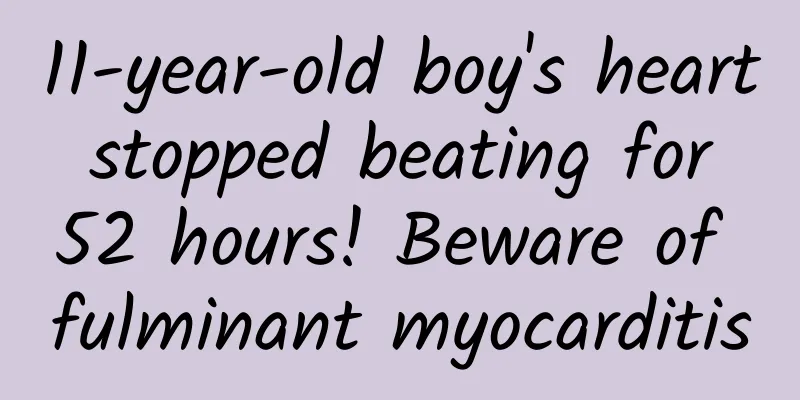11-year-old boy's heart stopped beating for 52 hours! Beware of fulminant myocarditis

|
Recently, an 11-year-old boy in Guangdong suffered repeated convulsions and severe heart rate disorders after a fever and was rushed to the hospital. During the rescue process, the boy's heart stopped beating for 52 hours. After a week of life support treatment and 37 days of full treatment, the child's physical indicators gradually recovered. Experts diagnosed it as fulminant myocarditis, a severe form of viral myocarditis. This incident once again shows that fulminant myocarditis is a disease with an insidious onset, rapid progression and a very high mortality rate. Beware of the threat hidden behind colds The initial symptoms of fulminant myocarditis are similar to those of the common cold, mostly manifested as symptoms of upper respiratory tract infection or intestinal infection. Patients may experience common symptoms such as cough, runny nose, sore throat, fever, diarrhea, etc. However, 7 to 10 days after the onset of the disease, patients may experience symptoms of heart discomfort such as chest tightness, palpitations, extreme fatigue, and easy sweating. If you experience these symptoms after a cold, you should be highly vigilant and go to the hospital for examination in time: feeling of oppression in the chest, difficulty breathing accompanied by abnormally accelerated, strengthened or irregular heartbeat, extreme fatigue that makes the patient feel weak all over, difficulty in performing simple activities, easy sweating, etc. According to clinical data, more than 50% of patients with viral myocarditis have a history of colds. Viral myocarditis is usually caused by viral infections, including influenza virus and adenovirus. After the human body is infected with these viruses, the viruses may directly invade myocardial cells and multiply in large numbers in them, destroying the structure and function of myocardial cells; they may also trigger the body's immune response, and the immune system may accidentally injure myocardial cells when attacking the virus, aggravating myocardial inflammation. In addition, bad living habits and factors may increase the risk of fulminant myocarditis. Overwork, staying up late for a long time, excessive mental stress, malnutrition, etc. will weaken the body's immunity and make the body more susceptible to virus attack. People with underlying diseases, such as heart disease patients, diabetics, and people with low immunity, are at a higher risk of disease. How is fulminant myocarditis treated? 1. Treatment of fulminant myocarditis The key is timely diagnosis and active treatment. Once myocarditis is suspected, the patient should be sent to the hospital for professional treatment immediately. 2. The hospital will take a series of treatment measures according to the specific situation of the patient: Life support treatment includes respiratory support, circulatory support, etc. For patients with cardiac arrest or severe arrhythmia, heart assist devices such as extracorporeal membrane oxygenation (ECMO) may be needed to maintain heart and lung function. 3. Antiviral treatment: Doctors will select appropriate antiviral drugs based on the type of virus to inhibit viral replication and spread and reduce myocardial inflammatory response. 4. Immunomodulatory therapy: Immunomodulatory therapy can reduce the damage of the immune system to myocardial cells. For example, the use of immunosuppressants such as glucocorticoids can inhibit excessive immune responses and protect myocardial cells. How to prevent fulminant myocarditis by improving lifestyle habits? 1. Regular exercise: Regular exercise can enhance physical fitness, improve human immunity, and enhance cardiopulmonary function. You can choose a suitable exercise method, such as running, swimming, yoga, etc., and exercise a certain number of times a week. 2. Maintain good eating habits: eat more fresh vegetables and fruits, whole grains, lean meat, fish and other foods, and reduce the intake of high-calorie, high-fat and high-sugar foods. 3. Regular flu vaccination and physical examination: For high-risk groups, such as those with weakened immune systems, flu vaccination and regular physical examinations are very important. Flu vaccination can effectively prevent influenza virus infection and reduce the risk of viral myocarditis. Regular physical examinations can detect potential health problems in a timely manner, so that early detection and early treatment can be achieved. In conclusion, fulminant myocarditis is a serious disease that is often neglected. Understanding its symptoms, causes, treatments, and prevention methods can help you better protect yourself from this potentially fatal risk. At the same time, timely medical treatment and maintaining good living habits are the key to preventing and controlling fulminant myocarditis. |
>>: Always waking up at 3 or 4 in the morning? It may be related to these 5 major diseases →
Recommend
Will the amount of vaginal discharge increase before menstruation?
Every woman will experience some pre-menstrual sy...
Does the 4D color ultrasound look like the one at birth?
The purpose of doing four-dimensional color ultra...
How to make your hands softer if they are rough
Today's women hold up half the sky. They have...
Pregnant again one and a half years after cesarean section
Caesarean section is also a way for women to give...
How to deal with acne on a woman's face
The reason why women get acne on their faces is t...
The first child had no reaction, but the second child had a big reaction
After pregnancy, the body will have a series of p...
What to do if you have a cough after a cesarean section
Ten months of pregnancy and one day of childbirth...
What are the symptoms of syphilis in women
In recent years, surveys have found that people&#...
Spontaneous miscarriage after more than one month of pregnancy
During the pregnancy process, I believe that the ...
7 ways for women to take care of their private parts and protect their health!
Women should be nicer to themselves, especially t...
How long after a miscarriage can I go out?
After a miscarriage, most people will feel that t...
Which type of cervical hyperplasia is more likely to become cancerous
Cervical hyperplasia is a common gynecological di...
Is it normal to have an endometrial thickness of 0.4 cm?
For a woman, pregnancy is related to many factors...
Can I eat durian when I have sex?
Eating durian is good for women, but can you eat ...
Contraceptive success rate
The success rate of contraception with an IUD is ...









